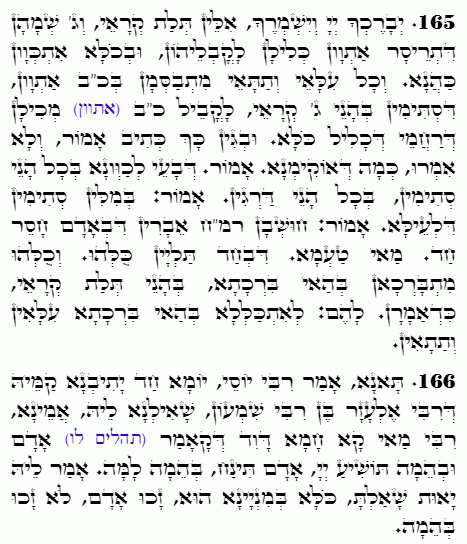Daily Zohar # 4577 – Naso – Say to them
Daily Zohar 4577

Hebrew translation:
166. לָמַדְנוּ, אָמַר רַבִּי יוֹסֵי, יוֹם אֶחָד יָשַׁבְתִּי לִפְנֵי רַבִּי אֶלְעָזָר בֶּן רַבִּי שִׁמְעוֹן וְשָׁאַלְתִּי אוֹתוֹ, אָמַרְתִּי, רַבִּי, מָה רָאָה דָוִד שֶׁאָמַר (תהלים לו) אָדָם וּבְהֵמָה תוֹשִׁיעַ ה’? אָדָם מֵילָא, בְּהֵמָה לָמָּה? אָמַר לוֹ, יָפֶה שָׁאַלְתָּ, הַכֹּל הוּא בְּמִנְיָן. זָכוּ – אָדָם. לֹא זָכוּ – בְּהֵמָה.
.
Zohar Naso
Continued from previous DZ
#165
Numbers 6:24
“יְבָרֶכְךָ יְהוָה וְיִשְׁמְרֶךָ”
“The LORD bless you and keep you;”
There are fifteen letters in these three words, “יברכך ה׳ וישמרך”. The three verses of the Priestly Blessing and the three YHVH names in each verse consist of twelve letters, as each name contains four letters. Three times four is twelve, and the three verses total fifteen. These are all included in the fifteen letters of “יברכך ה׳ וישמרך.” The priest meditating during his blessing. All the upper and lower realms are imbued with the twenty-two letters, meaning the twenty-two letters of the name, which are concealed in these three verses of the Priestly Blessing. These correspond to the twenty-two attributes of mercy that encompass everything.
Therefore, it is written “אָמוֹר להם” (“Say to them”) and not “אִמְרוּ להם” (“Say to them” in the plural), as we have established (#147). “אָמוֹר” (“Say”) indicates that one must meditate on all these concealed secrets at all these levels. “אָמוֹר” refers to the hidden things of above. “אָמוֹר” corresponds to the numerical value of 248, which is the number of organs in a person minus one. Their secret has been explained above (in Idra Rabba, #309). Why is it one less? Because all 248 organs depend on the One above, who is Arich Anpin, and all are blessed with these three verses blessing, as we have said. “להם” (“to them”) is written to include upper and lower levels with that blessing.
#166
Rabbi Yossi said, “One day, I was sitting before Rabbi Elazar, son of Rabbi Shimon, and I asked him, ‘Rabbi, why did David say,
Psalm 36:7
“צִדְקָתְךָ כְּהַרְרֵי אֵל מִשְׁפָּטֶךָ תְּהוֹם רַבָּה אָדָם וּבְהֵמָה תוֹשִׁיעַ יְהוָה.”
“Your righteousness is like the great mountains; Your judgments are a great deep; O YHVH, You preserve man and beast.”
Man, I understand, but why beast?’ He said to me, ‘You have asked well. It all pertains to the salvation: If they have merits to deserve salvation, they are saved as humans; if they are not deserving, they are saved as beasts.”
Lesson;
1. **Fifteen Letters**: The three words “יברכך ה׳ וישמרך” contain fifteen letters, which correlate with the structure of the Priestly Blessing and the divine names within it.
2. **Twenty-Two Letters**: The full scope of the blessing involves twenty-two letters, representing the complete set of Hebrew letters and linking to the twenty-two attributes of mercy (13+9 as previously explained).
3. **Numerical Significance**: The term “אָמוֹר” (say) has a numerical value of 247, the number of organs in a human body (248) minus one, signifying the dependence of all creation on the One above (Arich Anpin).
The priest’s meditation during the blessing integrates these elements, ensuring that the flow of Light reaches all levels, upper and lower. The instruction “אמור להם” emphasizes the singular focus required to invoke these profound connections, underscoring the nature of the blessing that encompasses all aspects of existence.
Rabbi Elazar suggests that the form and manner of salvation depend on the merits of the individuals. When people are deserving, they receive salvation in their elevated human state, reflecting their spiritual achievements. However, even when they are not deserving, God’s mercy extends to them in a more basic, perhaps less dignified form, akin to that of animals, ensuring that salvation is still granted in some manner. This interpretation underscores the inclusive and multifaceted nature of Hashem’s compassion.
{||}

 Previous: Naso
Previous: Naso

